lesson 7北京版小学英语六上
北京课改版六年级英语上册 Unit 7 What are the twelve animals 知识清单

Unit 7 What are the twelve animals?一、核心词汇1. 名词: animal动物tiger老虎,虎rat老鼠rabbit兔ox公牛stamp邮票worker工人order顺序2. 动词: decide决定choose选择start开始collect收集show显露;展示3. 数词: twelve十二二、拓展词汇1. 其他生肖动物名词: dragon龙snake蛇horse马sheep羊monkey猴rooster鸡dog狗pig猪2. 序数词: first第一second第二third第三fourth第四fifth第五3. 形容词: caring关心他人的;乐于助人的friendly 友好的;亲切的brave勇敢的sick不舒服的;生病的busy忙碌的三、核心句型1. Well, we Chinese named the year after twelve animals. 噢,我们中国人以十二种动物为每一年命名。
解读: 这是一个一般过去时的陈述句。
一般过去时用来表达在过去某个时间里发生的动作或存在的状态,常和表示过去的时间状语连用,如 yesterday, last night, in 1990等。
name在此作动词,意为“命名”。
举一反三: The Jade Emperor named the years in the order they finished the race.玉皇大帝以它们完成比赛的顺序为每年命名。
2. — How often does each animal come around? 每种动物多久轮一次?— Every twelve years. 每十二年。
解读:这是询问某动作或状态发生的频率的句型及其回答。
how often表示“多久一次”,常对always, usually, often, twice a day等表示频率的副词或短语提问。
京教版小学英语六上Unit 2Lesson 7

Vet: Why are you _________,little crying piggy? Little piggy: Oh, Doctor. I have a__________. stomachache Vet: What did you have ________ today? for lunch _____________________. I had a big bowl of soup Little piggy:I drank some rice with fish and vegetablesI had a _______________________. ______________________ big piece of chocolate cake and ______________________. some honey cookies too much Vet: I’m afraid you ate_________. some pills Little piggy:Yes, I did. Can you give me ____________, Doctor? _____________ in the no need Please take a long walk Vet: There is_______. afternoon and__________________. do not have supper Little piggy: What did you say, Doctor? stop eating too much Vet: I said you should _________________ and ________________. exercise more
soup
六年级【英语(北京版)】UNIT SEVEN WHAT ARE THE TWELVE (2)-2课件
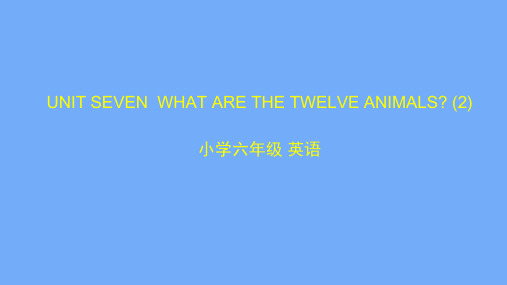
Read and underline-Page 52 Which animal won the race?
What did the Jade Emperor do next?
cycle
The rat starts the cycle.
Read and say He held a swimming race and decided to name the years after the twelve animals.
( T ) 4. The tiger was tired. ( T ) 5. The pig had to eat and sleep on the way.
Watch and follow
Let's summarize
The Jade Emperor held a swimming race to decide the order of the birth-year animals.
The rat jumped on the back of the ox. He pushed the cat into the river.
Think and tell What do you think of the rat?
I think the rat is clever, but he should help other animals.
Rat
Horse Rabbit
Ox
Sheep Snake
Why did the rat come first of the twelve animals?
Let's learn
What are they talking about? They are talking about a story about the birth-year animals.
六年级【英语(北京版)】UNIT SEVEN WHAT ARE THE TWELVE ANIMALS
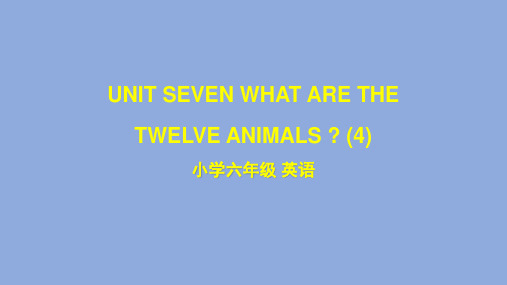
Let’s think
Traits
happy
hardworking
brave
friendly
popular wise
strong gentle smart proud caring honest
Let’s say
____ was born in the year of ____. ____ is as ____ as ____.
Can you tell more about me?
quiet patient hard-working
11
23
35
Traditional Chinese Wisdom
What are the twelve birth-year animals?
Let’s review
Name
Chinese birth-year animals
____ likes the____ best. ____ is as ____ as the ____.
Now I can write
P 57
animal
stamps started show
twelveLeabharlann Let’s summarize
Traits
Chinese birth-year animals
UNIT SEVEN WHAT ARE THE TWELVE ANIMALS ? (4)
小学六年级 英语
Learning objectives
1. Talk about the tradition of Chinese birth-year animals. 2. Talk about one’s favorite birth-year animals and their traits.
北京版-英语-六年级上册-Unit 7 How often does each animal come around 频度副词拓展
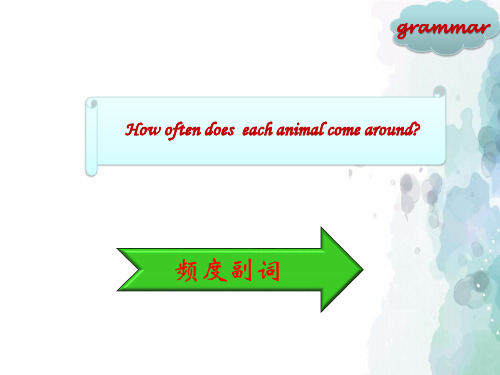
How often does each animal come around?
频度副词
频度副词短语
We clean his room once a week.(一周一次) You clean his room twice a week.(一周两次) We cleans her room three times a week. (一周三次) I cleans his room four times a week. (一周四次) I cleans her room five times a week. (一周五次)
每个月四次 four times a month
wash my clothes
Practice
I
一天三次 three times a day
每年两次 twice a year
每周一次 go to the cinema
once a week
如何提问? 对划线部分提问:
I play football once a week. How often do you play football?
一周两次
一年六次
twice a week six times a year
Practice
LilIy
每天 everyday
一个月四次 four times a m onth 每周两次 twice a week
listen once a day 每周两次 twice a week
Translate the phrases below:
一天一次 once a day
一天两次 twice a day
一 周三次 three times a week
北京版六年级英语上册第七单元知识点

Unit 7 知识点Lesson 23一、动词原形及现在分词(需背、默)name—named 命名enter—entered 进入bear—born 生/出生二、重点词组(需背、默)1. the year of the tiger 虎年2. the Chinese calendar 农历3. how often 多久一次4. every twelve years 每十二年5. birth--year animal 生肖6. name after…以…命名7. was/were born 出生三、重点句型(需背、默)1.---- How often does each animal come around? 每种动物多长时间轮回一次?---- Every twelve years. 每十二年。
2.---- How often does the girl go to the dentist? 这个女孩多长时间看一次牙医?---- Every six months. 每六个月。
3.---- How often do the boys practice together?这些个男孩们多长时间一起练习一次?---- Every three days. 每三天。
4.They are Rat, Ox, Tiger, Rabbit, Dragon, Snake, Horse, Sheep, Monkey, Rooster, Dog, and Pig. 它们是鼠、牛、虎、兔、龙、蛇、马、羊、猴、鸡、狗和猪。
四、我会说1.Happy Chinese New Year! 春节快乐!2.I was born in the year of the tiger. 我出生于虎年。
3.My birth--year animal is the tiger. 我的生肖是虎。
4.How interesting! 多有趣呀!5.I was born in the year of the horse, so my birth--year animal is the horse.我是在马年出生的,所以我的生肖是马。
北京版一年级起点小学英语六年级上(英语单词表)
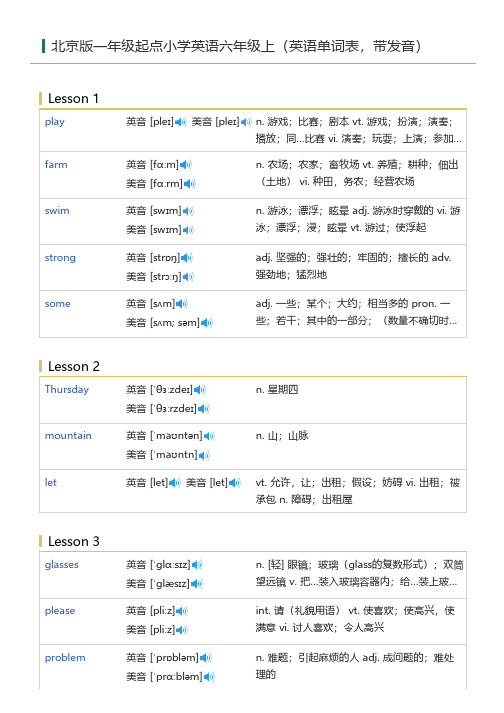
北京版一年级起点小学英语六年级上(英语单词表,带发音)Lesson 1Lesson 2Lesson 3play英音 [ple ɪ]美音 [ple ɪ]n. 游戏;比赛;剧本 vt. 游戏;扮演;演奏;播放;同…比赛 vi. 演奏;玩耍;上演;参加…farm英音 [fɑːm]美音 [fɑːrm]n. 农场;农家;畜牧场 vt. 养殖;耕种;佃出(土地) vi. 种田,务农;经营农场swim英音 [sw ɪm]美音 [sw ɪm]n. 游泳;漂浮;眩晕 adj. 游泳时穿戴的 vi. 游泳;漂浮;浸;眩晕 vt. 游过;使浮起strong英音 [str ɒŋ]美音 [str ɔːŋ]adj. 坚强的;强壮的;牢固的;擅长的 adv.强劲地;猛烈地some英音 [s ʌm]美音 [s ʌm; s əm]adj. 一些;某个;大约;相当多的 pron. 一些;若干;其中的一部分;(数量不确切时…Thursday英音 [ˈθɜːzde ɪ]美音 [ˈθɜːrzde ɪ]n. 星期四mountain英音 [ˈma ʊnt ən]美音 [ˈma ʊntn]n. 山;山脉let英音 [let]美音 [let]vt. 允许,让;出租;假设;妨碍 vi. 出租;被承包 n. 障碍;出租屋glasses英音 [ˈɡlɑːs ɪz]美音 [ˈɡlæs ɪz]n. [轻] 眼镜;玻璃(glass的复数形式);双筒望远镜 v. 把…装入玻璃容器内;给…装上玻…please英音 [pli ːz]美音 [pli ːz]int. 请(礼貌用语) vt. 使喜欢;使高兴,使满意 vi. 讨人喜欢;令人高兴problem英音 [ˈpr ɒbl əm]美音 [ˈprɑːbl əm]n. 难题;引起麻烦的人 adj. 成问题的;难处理的Lesson 5Lesson 6Lesson 7Lesson 9young英音 [j ʌŋ]美音 [j ʌŋ]n. 年轻人;(动物的)崽,仔 adj. 年轻的;初期的;没有经验的neck英音 [nek]美音 [nek]n. 脖子;衣领;海峡 vi. 搂著脖子亲吻;变狭窄 vt. 使变细;与…搂著脖子亲吻but英音 [b ət]美音 [b ət; b ʌt]conj. 但是;而是;然而 adv. 仅仅,只 prep.除…以外football英音 [ˈf ʊtb ɔːl]美音 [ˈf ʊtb ɔːl]n. 足球,橄榄球 vi. 踢足球;打橄榄球match英音 [mæt ʃ]美音 [mæt ʃ]vt. 使比赛;使相配;敌得过,比得上;相配;与…竞争 vi. 比赛;匹配;相配,相称;相比…myself英音 [ma ɪˈself]美音 [ma ɪˈself]pron. 我自己;我亲自;我的正常的健康状况和正常情绪cry英音 [kra ɪ]美音 [kra ɪ]n. 叫喊;叫声;口号;呼叫 vi. 哭;叫;喊 vt.叫喊;哭出;大声说lunch英音 [l ʌnt ʃ]美音 [l ʌnt ʃ]n. 午餐 vt. 吃午餐;供给午餐 vi. 吃午餐;供给午餐chocolate英音 [ˈt ʃɒkl ət]美音 [ˈt ʃɔːkl ət]n. 巧克力,巧克力糖;巧克力色 adj. 巧克力色的;巧克力口味的supper英音 [ˈs ʌp ə(r)]美音 [ˈs ʌp ər]n. 晚餐,晚饭;夜宵see 英音 [si ː]美音 [si ː]vi. 看;看见;领会 vt. 看见;理解;领会Monday英音 [ˈm ʌnde ɪ]n. 星期一Lesson 10 Lesson 11 Lesson 15美音 [ˈmʌndeɪ]hotel英音 [həʊˈtel]美音 [hoʊˈtel]n. 旅馆,饭店;客栈 vt. 使…在饭店下榻 vi. 进行旅馆式办公angry英音 [ˈæŋɡri]美音 [ˈæŋɡri]adj. 生气的;愤怒的;狂暴的;(伤口等)发炎的hill英音 [hɪl]美音 [hɪl]n. 小山;丘陵;斜坡;山冈west 英音 [west]美音 [west]n. 西;西方;西部 adj. 西方的;朝西的 adv.在西方;向西方;自西方around英音 [əˈraʊnd]美音 [əˈraʊnd]prep. 四处;在…周围 adv. 大约;到处;在附近many英音 [ˈmeni]美音 [ˈmeni]pron. 许多;许多人 adj. 许多的ride英音 [raɪd]美音 [raɪd]n. 骑;乘坐;交通工具;可供骑行的路;(乘坐汽车等的)旅行;乘骑;(乘车或骑车的…horse英音 [hɔːs]美音 [hɔːrs]n. 马;骑兵;脚架;海洛因 vt. 使骑马;系马于;捉弄 vi. 骑马;作弄人smart英音 [smɑːt]美音 [smɑːrt]adj. 聪明的;巧妙的;敏捷的;厉害的;潇洒的;剧烈的;时髦的PE英音 [peɪ]美音 [peɪ]abbr. 体育课,体能训练(physicaleducation)history英音 [ˈhɪst(ə)ri]美音 [ˈhɪstri]n. 历史,历史学;历史记录;来历those英音 [ðəʊz]adj. 那些的 pron. 那些(that的复数)Lesson 16 Lesson 17 Lesson 19 Lesson 20美音 [ðoʊz]modern英音 [ˈmɒdn]美音 [ˈmɑːdərn]adj. 现代的,近代的;时髦的 n. 现代人;有思想的人stop英音 [stɒp]美音 [stɑːp]n. 停止;车站;障碍;逗留 vi. 停止;中止;逗留;被塞住 vt. 停止;堵塞;断绝ago英音 [əˈɡəʊ]美音 [əˈɡoʊ]adj. 以前的;过去的 adv. 以前,以往hold英音 [həʊld]美音 [hoʊld]n. 控制;保留 vi. 支持;有效;持续 vt. 持有;拥有;保存;拘留;约束或控制 又作…take part in na. 参加;贡献number英音 [ˈnʌmbə(r)]美音 [ˈnʌmbər]n. 数;(杂志等的)期;号码;数字;算术vi. 计入;总数达到 vt. 编号;计入;数…的…visitor英音 [ˈvɪzɪtə(r)]美音 [ˈvɪzɪtər]n. 访问者,参观者;视察者;候鸟world英音 [wɜːld]美音 [wɜːrld]n. 世界;领域;世俗;全人类;物质生活tie英音 [taɪ]美音 [taɪ]n. 领带;平局;鞋带;领结;不分胜负 vi. 打结;不分胜负;被用带(或绳子等)系住 vt.…Mr英音 [ˈmɪstə(r)]美音 [ˈmɪstər]abbr. 先生(Mister)goodbye英音 [ˌɡʊdˈbaɪ]美音 [ˌɡʊdˈbaɪ]int. 再见 放弃 告别Lesson 21Lesson 23singer 英音 [ˈs ɪŋə(r)]美音 [ˈs ɪŋər]n. 歌手,歌唱家stage 英音 [ste ɪd ʒ]美音 [ste ɪd ʒ]n. 阶段;舞台;戏剧;驿站 vt. 举行;上演;筹划 vi. 举行;适于上演;乘驿车旅行dress 英音 [dres]美音 [dres]n. 连衣裙;女装 vt. 给…穿衣 vi. 穿衣sing 英音 [s ɪŋ]美音 [s ɪŋ]n. 演唱;鸣声;呼啸声 vt. 唱;用诗赞颂;唱着使 vi. 唱歌;歌颂;鸣叫;呼号like英音 [la ɪk]美音 [la ɪk]vt. 喜欢;想;愿意 vi. 喜欢;希望 prep. 像;如同 adj. 同样的;相似的 n. 爱好;同样的…colour英音 [ˈk ʌl ə(r)]美音 [ˈk ʌl ər]n. 颜色;风格;气色,面色;外貌 vt. 把…涂颜色,粉饰;歪曲;使脸红 vi. 变色clothes英音 [kl əʊðz]美音 [klo ʊðz; klo ʊz]n. 衣服hobby英音 [ˈh ɒbi]美音 [ˈhɑːbi]n. 嗜好;业余爱好tiger英音 [ˈta ɪɡə(r)]美音 [ˈta ɪɡər]n. 老虎;凶暴的人twelve英音 [twelv]美音 [twelv]num. 十二;十二个 n. 十二;十二个 adj. 十二的;十二个的animal英音 [ˈæn ɪm(ə)l]美音 [ˈæn ɪm(ə)l]n. 动物 动物的rat 英音 [ræt]美音 [ræt]n. 鼠;卑鄙小人,叛徒 vi. 捕鼠;背叛,告密rabbit英音 [ˈræb ɪt]美音 [ˈræb ɪt]n. 兔子,野兔 vt. 让…见鬼去吧 vi. 猎兔Lesson 24Lesson 25decide英音 [d ɪˈsa ɪd]美音 [d ɪˈsa ɪd]vi. 决定,下决心 vt. 决定;解决;判决order英音 [ˈɔːd ə(r)]美音 [ˈɔːrd ər]n. 命令;顺序;规则;[贸易] 定单 vt. 命令;整理;定购 vi. 命令;定货choose英音 [t ʃu ːz]美音 [t ʃu ːz]vt. 选择,决定 vi. 选择,挑选start英音 [stɑːt]美音 [stɑːrt]n. 开始;起点 vt. 开始;启动 vi. 出发stamp英音 [stæmp]美音 [stæmp]n. 邮票;印记;标志;跺脚 vt. 铭记;标出;盖章于…;贴邮票于…;用脚踩踏 vi. 跺脚;…collect英音 [k əˈlekt]美音 [k əˈlekt]vt. 收集;募捐 adj. 由收件人付款的 vi. 收集;聚集;募捐 adv. 由收件人付款地show英音 [ʃəʊ]美音 [ʃo ʊ]n. 显示;表演;炫耀 vt. 显示;说明;演出;展出 vi. 显示;说明;指示ox 英音 [ɒks]美音 [ɑːks]n. 牛;公牛worker英音 [ˈw ɜːk ə(r)]美音 [ˈw ɜːrk ər]n. 工人;劳动者;职蚁。
六年级【英语(北京版)】UNIT SEVEN WHAT ARE THE?(2)-1教学设计

Order of the twelve birth-year animals
How often does each animal come around?
Yes, every twelve years.
1min
Read and say
You have done a great job! Can you read and fill in the blanks? Have a try.
Now can you tell me the answers?
He held a swimming race...
2mins
Now let’s watch and follow.
1min
Summary
Now let’s summarize. Today we’ve learned more about the birth-year animals.
Can you read and fill in the blanks? Have a try.
What happened in the story? Now let’s listen.(第二次听)
Now can you tell me the answers?
The Jade Emperor. Read after me. It means玉皇大帝。
2. The Jade Emperor held a swimming race.
decided to name the years after the twelve animals.30sLet’s learn
北京版-英语-六年级上册-Unit 7 What are the twelve animals Chinese Lunar Calendar
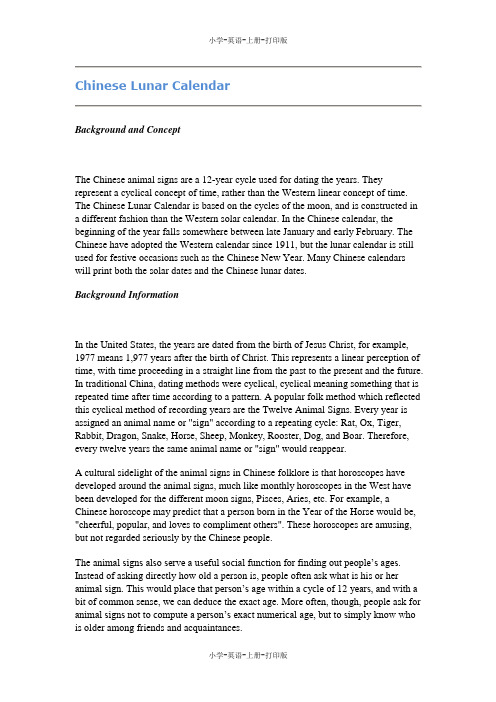
Chinese Lunar CalendarBackground and ConceptThe Chinese animal signs are a 12-year cycle used for dating the years. They represent a cyclical concept of time, rather than the Western linear concept of time. The Chinese Lunar Calendar is based on the cycles of the moon, and is constructed in a different fashion than the Western solar calendar. In the Chinese calendar, the beginning of the year falls somewhere between late January and early February. The Chinese have adopted the Western calendar since 1911, but the lunar calendar is still used for festive occasions such as the Chinese New Year. Many Chinese calendarswill print both the solar dates and the Chinese lunar dates.Background InformationIn the United States, the years are dated from the birth of Jesus Christ, for example, 1977 means 1,977 years after the birth of Christ. This represents a linear perception of time, with time proceeding in a straight line from the past to the present and the future. In traditional China, dating methods were cyclical, cyclical meaning something that is repeated time after time according to a pattern. A popular folk method which reflected this cyclical method of recording years are the Twelve Animal Signs. Every year is assigned an animal name or "sign" according to a repeating cycle: Rat, Ox, Tiger, Rabbit, Dragon, Snake, Horse, Sheep, Monkey, Rooster, Dog, and Boar. Therefore, every twelve years the same animal name or "sign" would reappear.A cultural sidelight of the animal signs in Chinese folklore is that horoscopes have developed around the animal signs, much like monthly horoscopes in the West have been developed for the different moon signs, Pisces, Aries, etc. For example, a Chinese horoscope may predict that a person born in the Year of the Horse would be, "cheerful, popular, and loves to compliment others". These horoscopes are amusing, but not regarded seriously by the Chinese people.The ani mal signs also serve a useful social function for finding out people’s ages. Instead of asking directly how old a person is, people often ask what is his or her animal sign. This would place that person’s age within a cycle of 12 years, and with a bit of common sense, we can deduce the exact age. More often, though, people ask for animal signs not to compute a person’s exact numerical age, but to simply know who is older among friends and acquaintances.LegendAccording to Chinese legend, the twelve animals quarreled one day as to who was to head the cycle of years. The gods were asked to decide and they held a contest: whoever was to reach the opposite bank of the river would be first, and the rest of the animals would receive their years according to their finish.All the twelve animals gathered at the river bank and jumped in. Unknown to the ox, the rat had jumped upon his back. As the ox was about to jump ashore, the rat jumped off the ox's back, and won the race. The pig, who was very lazy, ended up last. That is why the rat is the first year of the animal cycle, the ox second, and the pig last.Zodiac Chart:The rotating cycle of twelve animal signs was a folk method for naming the years in traditional China. The animal signs for one another in an established order, and are repeated every twelve years. 1976 was the Year of the Dragon, and 1977 was the year of the Snake.The Year of the Dog1922, 1934, 1946, 1958, 1970, 1982, 1994, 2006People born in the Year of the Dog possess the best traits ofhuman nature. They have a deep sense of loyalty, are honest,and inspire other people¡¦s confidence because they knowhow to keep secrets. But Dog People are somewhat selfish,terribly stubborn, and eccentric. They care little for wealth, yet somehow always seem to have money. They can be cold emotionally and sometimes distant at parties. They can find fault with many things and are noted for their sharp tongues. Dog people make good leaders. They are compatible with those born in the Years of the Horse, Tiger, and RabbitThe Year of the Pig1923, 1935, 1947, 1959, 1971, 1983, 1995, 2007People born in the Year of the Pig are chivalrous andgallant. Whatever they do, they do with all theirstrength. For Boar Year people, there is no left or rightand there is no retreat. They have tremendous fortitude and great honesty. They don't make many friends but they make them for life, and anyone having a Boar Year friend is fortunate for they are extremely loyal. They don't talk much but have a great thirst for knowledge. They study a great deal and are generally well informed. Boar people are quick tempered, yet they hate arguments and quarreling. They are kind to their loved ones. No matter how bad problems seem to be, Boar people try to work them out, honestly if sometimes impulsively. They are most compatible with Rabbits and SheepThe Year Of The Rooster1921, 1933, 1945, 1957, 1969, 1981, 1993, 2005People born in the Year of the Rooster are deep thinkers,capable, and talented. They like to be busy and aredevoted beyond their capabilities and are deeplydisappointed if they fail. People born in the Rooster Yearare often a bit eccentric, and often have rather difficultrelationship with others. They always think they are rightand usually are! They frequently are loners and thoughthey give the outward impression of being adventurous, they are timid. Rooster people¡¦s emotions like their fortunes, swing very high to very low. They can be selfish and too outspoken, but are always interesting and can be extremely brave. They are most compatible with Ox, Snake, and Dragon.The Year Of The Monkey1920, 1932, 1944, 1956, 1968, 1980, 1992, 2004People born in the Year of the Monkey are the erraticgeniuses of the cycle. Clever, skillful, and flexible, they areremarkably inventive and original and can solve the most difficult problems with ease. There are few fields in which Monkey people wouldn't be successful but they have a disconcerting habit of being too agreeable. They want to do things now, and if they cannot get started immediately, they become discouraged and sometimes leave their projects. Although good at making decisions, they tend to look down on others. Having common sense, Monkey people have a deep desire for knowledge and have excellent memories. Monkey people are strong willed but their anger cools quickly. They are most compatible with the Dragon and RatThe Year Of The Ram1919, 1931, 1943, 1955, 1967, 1979, 1991, 2003People born in the Year of Ram are elegant and highlyaccomplished in the arts. They seem to be, at firstglance, better off than those born in the zodiac's otheryears. But ram year people are often shy, pessimistic,and puzzled about life. They are usually deeply religious,yet timid by nature. Sometimes clumsy in speech, they are always passionate about what they do and what they believe in. Ram people never have to worry about having the best in life for their abilities make money for them, and they are able to enjoy the creature comforts that they like. Ram people are wise, gentle, and compassionate. They are compatible with Rabbits, Pigs, and Horses.The Year Of The Horse1918, 1930, 1942, 1954, 1966, 1978, 1990, 2002People born in the Year of the Horse are popular. Theyare cheerful, skillful with money, and perceptive,although they sometimes talk too much. The are wise,talented, good with their hands, and sometimes have aweakness for members of the opposite sex. They are impatient and hot-blooded about everything except their daily work. They like entertainment and large crowds. They are very independent and rarely listen to advice. They are most compatible with Tigers, Dogs, and Sheep.The Year Of The Snake1917, 1929, 1941, 1953, 1965, 1977, 1989, 2001People born in the Year of the Snake are deep. They saylittle and possess great wisdom. They never have toworry about money; they are financially fortunate. Snake people are often quite vain, selfish, and a bit stingy. Yet they have tremendous sympathy for others and try to help those less fortunate. Snake people tend to overdo, since they have doubts about other people's judgment and prefer to rely on themselves. They are determined in whatever they do and hate to fail. Although calm on the surface, they are intense and passionate. Snake people are usually good-looking and sometimes have marital problems because they are fickle. They are most compatible with the Ox and Rooster.The Year of the Dragon1916, 1928, 1940, 1952, 1964, 1976, 1988, 2000People born in the Year of the Dragon are healthy,energetic, excitable, short-tempered, and stubborn. Theyare also honest, sensitive, brave, and they inspireconfidence and trust. Dragon people are the most eccentric of any in the eastern zodiac. They neither borrow money nor make flowery speeches, but they tend to be soft-hearted which sometimes gives others an advantage over them. They are compatible with Rats, Snakes, Monkeys, and Roosters.The Year Of The Rabbit1915, 1927, 1939, 1951, 1963, 1975, 1987, 1999People born in the Year of the Rabbit are articulate,talented, and ambitious. They are virtuous, reserved,and have excellent taste. Rabbit people are admired,trusted, and are often financially lucky. They are fond of gossip but are tactful and generally kind. Rabbit people seldom lose their temper. They are clever at business and being conscientious, never back out of a contract. They would make good gamblers for they have the uncanny gift of choosing the right thing. However, they seldom gamble, as they are conservative and wise. They are most compatible with those born in the years of the Sheep, Pig, and Dog.The Year Of The Tiger1914, 1926, 1938, 1950, 1962, 1974, 1986, 1998Tiger people are sensitive, given to deep thinking,capable of great sympathy. They can be extremelyshort-tempered, however. Other people have greatrespect for them, but sometimes tiger people come intoconflict with older people or those in authority. sometimes Tiger people cannot make up their minds, which can result in a poor, hasty decision or a sound decision arrived at too late. They are suspicious of others, but they are courageous and powerful. Tigers are most compatible with Horses, Dragons, and DogsThe Year of the Ox1913, 1925, 1937, 1949, 1961, 1973, 1985, 1997People born in the Year of the Ox are patient, speak little,and inspire confidence in others. They tend, however, to beeccentric, and bigoted, and they anger easily. They havefierce tempers and although they speak little, when they do they are quite eloquent. Ox people are mentally and physically alert. Generally easy-going, they can be remarkably stubborn, and they hate to fail or be opposed. They are most compatible with Snake, Rooster, and Rat people.The Year Of The Rat1912, 1924, 1936, 1948, 1960, 1972, 1984, 1996People born in the Year of the Rat are noted for their charmand attraction for the opposite sex. They work hard toachieve their goals, acquire possessions, and are likely to beperfectionists. They are basically thrifty with money. Ratpeople are easily angered and love to gossip. Their ambitions are big, and they are usually very successful. They are most compatible with people born in the years of the Dragon, Monkey, and Ox.The Chinese Zodiac, known as Sheng Xiao in Chinese, is based on a twelve year cycle, each year in that cycle related to an animal sign. These animal signs are the rat, ox, tiger, rabbit, dragon, snake, horse, sheep, monkey, rooster, dog and pig. The Chinese zodiac is calculated according to Chinese lunarcalendar . You can use the above tool to search for your Chinese zodiac. Selectyour Gregorian date of birth, and you'll reveal your date of birth according toChinese lunar calendar together with your Chinese zodiac sign.Origin of Chinese ZodiacSimilar to theten heavenly stemsand twelve earthly branches, animals in Chinese zodiac were also created for counting years as the system that is now universally accepted based on the Christian calendar was as yet non-existent. The selection and order of the animals that influence people's lives very much was originated in the Han Dynasty (206 – 220) and based upon each animal's character and living habits. The old time division was mostly related to number 12: one ji equals 12 years, one year has 12 months, one day has 12 time periods called shi chen. Ancient people observe that there are 12 full moons within one year. So, the origin of Chinese zodiac is associated with astronomy. In Chinese tradition, each animal sign is usually related with an earthly branch, so the animal years were called zi rabbit, chou ox, yin tiger, mao rabbit, chen dragon, si snack, wu horse, wei sheep, shen monkey, you rooster, xu dog and hai pig.12 Animal SignsFor a long time there has been a special relationship between humans and the 12 zodiacal animals. Chinese people believe that the years represented by the animals affect the characters of people in the same manner as the sign of zodiac adopted by western civilizations. Click the following signs to know information on the characters of persons under different signs. Interesting facts like zodiac years, strengths, weaknesses, best matches and fortune of 2011 of each sign are introduced.Rat Ox Tiger Rabbit Dragon SnakeHorseSheepMonkeyRoosterDog Pig Legend about Chinese ZodiacLegend has it that one day the gods ordered that animals be designated as signs of each year and the twelve that arrived first were selected. At that time, the cat and the rat were good friends and neighbors. When they heard of this news, the cat said to the rat: 'We should arrive early to sign up, but I usually get up late.' The rat then promised to awaken his friend and to go together . However , on the morning when he got up, he was too excited to recall his promise, and went directly to the gathering place. On the way, the rat encountered the tiger , ox, horse, and other animals that ran much faster . In order not to fall behind them, he thought up a good idea. He made the straightforward ox carry him on condition that he sang for the ox. The ox and the rat arrived first. The ox was happy thinking that he would be the first sign of the years, but the rat had already slid in front, and became the first lucky animal of the Chinese zodiac. Meanwhile his neighbor the cat was too late so when it finally arrived, the selection was over . That's why other animals appear behind the little rat and why the cat hates the rat so much that every time they meet, the cat will chase and kill the rat.小学-英语-上册-打印版小学-英语-上册-打印版。
北京课改版英语六年级英语上册 Unit 7 知识清单
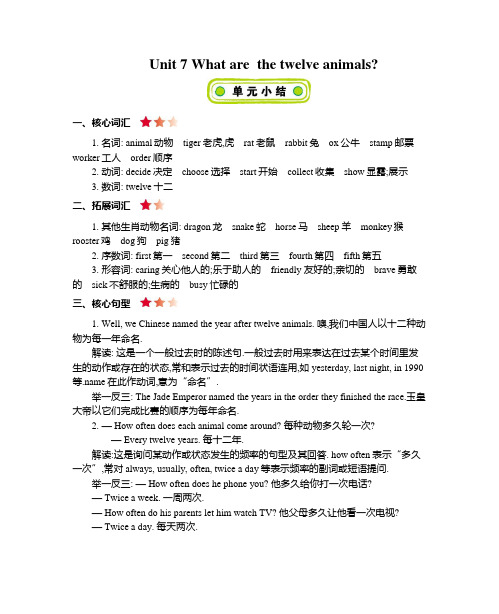
Unit 7 What are the twelve animals?一、核心词汇1. 名词: animal动物tiger老虎,虎rat老鼠rabbit兔ox公牛stamp邮票worker工人order顺序2. 动词: decide决定choose选择start开始collect收集show显露;展示3. 数词: twelve十二二、拓展词汇1. 其他生肖动物名词: dragon龙snake蛇horse马sheep羊monkey猴rooster鸡dog狗pig猪2. 序数词: first第一second第二third第三fourth第四fifth第五3. 形容词: caring关心他人的;乐于助人的friendly 友好的;亲切的brave勇敢的sick不舒服的;生病的busy忙碌的三、核心句型1. Well, we Chinese named the year after twelve animals. 噢,我们中国人以十二种动物为每一年命名.解读: 这是一个一般过去时的陈述句.一般过去时用来表达在过去某个时间里发生的动作或存在的状态,常和表示过去的时间状语连用,如 yesterday, last night, in 1990等.name在此作动词,意为“命名”.举一反三: The Jade Emperor named the years in the order they finished the race.玉皇大帝以它们完成比赛的顺序为每年命名.2. — How often does each animal come around? 每种动物多久轮一次?— Every twelve years. 每十二年.解读:这是询问某动作或状态发生的频率的句型及其回答. how often表示“多久一次”,常对always, usually, often, twice a day等表示频率的副词或短语提问.举一反三: — How often does he phone you? 他多久给你打一次电话?— Twice a week. 一周两次.— How often do his parents let him watch TV? 他父母多久让他看一次电视?— Twice a day. 每天两次.3. Who decided the order of the birth-year animals, Yangyang?洋洋,谁决定了生肖的顺序呢?解读: 这是由疑问词who引导的一般过去时的特殊疑问句,用来询问谁在过去做了什么.who在句中作主语.举一反三: Who went to the park yesterday?昨天谁去公园了?Who got the prize today? 今天谁得奖了?4. — Which animal was the first of the twelve?十二生肖里哪个动物是第一个? — It was the rat. 鼠.解读: 这是由which引导的一般过去时的特殊疑问句, 用来询问第一个是什么.如果指的是现在已经形成习惯了的事物,我们可以用一般现在时,在特定的情况下 (如故事中) 可以用一般过去时. first是序数词,意为“第一”,前面常加定冠词the.举一反三: — Which season is the second of the four?在四季中哪一个季节是第二个?— It is summer. 夏季.— Which month is the third of the year?一年中哪个月是第三个?— It is March. 三月.5. I’ll show them to you. 我将把它们展示给你看.解读: 这是一个一般将来时的陈述句.show sth to sb = show sb sth 意为“把某物展示给某人看”.举一反三: He will go to Beijing tomorrow. 明天他要去北京.Lingling will see the pandas and monkeys, too. 玲玲也要去看熊猫和猴子.6. I work as hard as an ox. 我像牛一样勤劳.解读: 这是表达和某人/某物一样的句型.as … as意为“和……一样”.使用时要注意,第一个as为副词,第二个as为连词.其否定式为“not as/so + 形容词/副词 + as”.举一反三: My brother is as smart as a monkey. 我弟弟像猴子一样聪明.四、了解句型1. What do you mean? 你是什么意思?解读: 这是一个由what引导的一般现在时的特殊疑问句.2. What a surprise!真是个惊喜!解读: 这是一个由what引导的感叹句.感叹句可以是一个词或一个短语.如: Happy Chinese New Year! 中国新年快乐! Happy Year of the Tiger! 虎年快乐!How interesting! 真有趣!3. I know you were born in the year of the tiger. 我知道你是在虎年出生的.解读: 这是一个含有宾语从句的句子,主句是I know,从句you were born in the year of the tiger在句中作宾语.。
六年级上册英语教案UNITTWOWHATHAPPENEDTOYOURNECKLesson7北京版
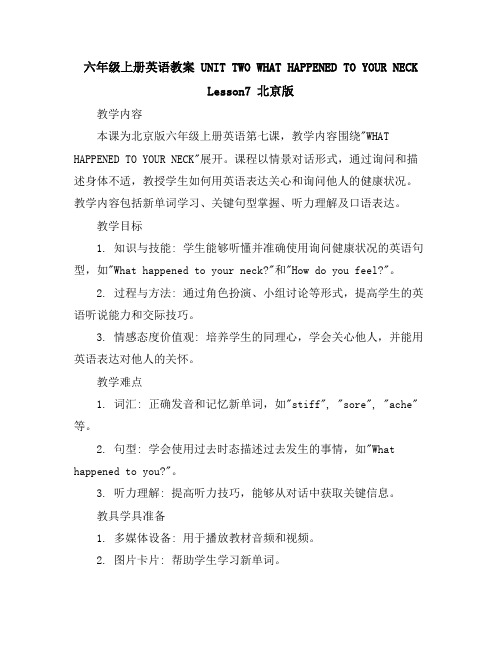
六年级上册英语教案 UNIT TWO WHAT HAPPENED TO YOUR NECKLesson7 北京版教学内容本课为北京版六年级上册英语第七课,教学内容围绕"WHAT HAPPENED TO YOUR NECK"展开。
课程以情景对话形式,通过询问和描述身体不适,教授学生如何用英语表达关心和询问他人的健康状况。
教学内容包括新单词学习、关键句型掌握、听力理解及口语表达。
教学目标1. 知识与技能: 学生能够听懂并准确使用询问健康状况的英语句型,如"What happened to your neck?"和"How do you feel?"。
2. 过程与方法: 通过角色扮演、小组讨论等形式,提高学生的英语听说能力和交际技巧。
3. 情感态度价值观: 培养学生的同理心,学会关心他人,并能用英语表达对他人的关怀。
教学难点1. 词汇: 正确发音和记忆新单词,如"stiff", "sore", "ache"等。
2. 句型: 学会使用过去时态描述过去发生的事情,如"What happened to you?"。
3. 听力理解: 提高听力技巧,能够从对话中获取关键信息。
教具学具准备1. 多媒体设备: 用于播放教材音频和视频。
2. 图片卡片: 帮助学生学习新单词。
3. 角色扮演道具: 如医生服装、病人表情图等,增加互动趣味性。
教学过程1. 导入: 通过展示一张脖子不适的图片,引起学生兴趣,导入新课主题。
2. 新知呈现: 利用多媒体展示句型和单词,讲解语法点。
3. 实践练习: 学生分组进行角色扮演,模拟医生与病人的对话。
4. 巩固提高: 通过听力练习和小游戏,加深学生对知识点的理解。
板书设计板书将简洁明了地呈现本课的关键单词、句型及语法点。
使用不同颜色粉笔突出重点,便于学生记忆。
- 1、下载文档前请自行甄别文档内容的完整性,平台不提供额外的编辑、内容补充、找答案等附加服务。
- 2、"仅部分预览"的文档,不可在线预览部分如存在完整性等问题,可反馈申请退款(可完整预览的文档不适用该条件!)。
- 3、如文档侵犯您的权益,请联系客服反馈,我们会尽快为您处理(人工客服工作时间:9:00-18:30)。
附:填空。 1. I 2. -3. --What --He book. 4. They all (go) to the mountains yesterday morning. (have) an exciting party last weekend. she Tom (watch) TV and (practice) her guitar yesterday? (do) on last night? (read) an interesting
We told stories. (told---tell) He pulled out the bad tooth. (pull---pulled) 【设计意图】通过再次听录音、跟读的过程,让学生说出动词一过去式变化 的基本规则。 (三)Practice 活动四,听一听,说一说,演一演 【活动目标】进一步熟悉课文内容,特别是动词过去式的变化。 【实施方法】1. 再次播放录音,学生分角色跟读。 2. 小组表演。 T: Let’s listen again and please read in roles. T: I will give you 3 minutes,you can practice with your partners。 T: Who wants to act in the class? Let’s welcome! 【设计意图】通过再次听录音并分角色朗读对话,加深学生的印象。 活动五,创编新对话 【活动目标】训练学生在实际情境中试着正确运用语言。 【实施方法】1.教师为学生提供相应的地点和活动的图片,要求学生以小组 为单位进行对话练习。 2.开展 group work,请学生仿照对话,根据自己的真实喜好,创 编新对话。 3.教师巡视指导,重点帮助编对话有困难的学生。 4.请创编好的小组在班里表演自己创编的新对话。 T: Work in pairs, try to make a new dialogue according to the text. T: Who wants to show? S: We want to try…. 【Homework】 1. Listen to the tape and read the text. 2. Write the new words or make a new dialogue like Lesson 7. 附:选择。 ( ) 1. Sara a high fever yesterday. She to see doctor
标 情感、态度
学 习 重 点 pull, tooth(teeth). 学 习 难 点 教、学具准 备 The usage of the past tense. Flash cards, white e-board
Lesson 7 板 书 What did you say? 设 计 I said you should stop eating too much.
英语 学科电子教案
课 题 Lesson 7 授课课时 2 授课时间 2015-9-24 课标对本节课的要求:Master the key sentences and new words 学生已有的认知分析:they have learnt how to express a disease 德育渗透点:Keep a healthy diet
【实施方法】 1.教师引导听之前要进行预测,先关注语意,预测句子的含义;认真思考后 再判断;再思考听到的和我判断的有哪些差别。 2.听录音答题。 (验证预测的过程)听录音之后自我检测和自己预测的结果 有何不同;修正预测。 3.教师全班核定结果(可通过再听一遍听力材料的方式检测) ;讲解错误的 问题所在。 T:(1)Please look at your books and read the sentences by yourself, guess the sentence meaning. (2)Please listen to the tape and write down your answers. (3)Let’s check the answers. 活动四,读一读,写一写 【活动目标】通过读读写写的练习,训练学生掌握所学知识,并能应用。 【实施方法】 1.请学生独立阅读书上待补全的句子,根据句子语境,思考整个语段的含义。 2.请学生按自己的判断试补全句子,然后朗读语段,检查自己的判断是否正 确 T: (1) Please look at your books and read the sentences by yourself. (2) Discuss with your partner. (3) Write down the answers. (4) Check the answers. 活动五,小练习 【活动目标】通过课堂小练习检测学生本课的学习情况,及时发现知识的漏 洞,以查漏补缺。 【Homework】 1. Finish the exercises in Activity Book. 2. Read the text at least 3 times.
with her father. A. had, went ( B. have, went C. have, go
) 2. -- Did you go to see the doctor? -- Yes, I did. -- What -- He the doctor say? I should drink a lot of water.
知识与能力 学 习 目 过程与方法
Master the key sentences and new words
They could use skimming and scanning to find the correct answer. Help and learn from each other. 价值观 The new phrases: toothache, dentist, stop, chocolate,
(
) 5. -- What did the dentist do? -- He A. pulled out the bad tooth. B. pulls C. pull basketball.
(
) 6. It’s too noisy. You should stop A. play B. plays C. playing
--No, she _________.
5. She (stay) at home.
(not visit) her aunt last weekend. She
本节课教师的收获: 本节课学生的收获:
习
流
程 修改分析
通过学习本课,应复 习以往所学知识,如 He said she should stop eating too much chocolate and cakes. stop fast food, healthy He pulled out the bad tooth. pull food 等。 tooth/teeth
A. did, said ( ) 3. I A. go (
B. do, say
C. did, say
to see the doctor this morning. B. went C. goes too much sugar.
) 4. You are so fat. You should stop A. eat B. eats C. eating
【设计意图】让学生整体感知课文内容,通过这一环节学习要求掌握的句型 及词语。体会如何在情境中描述过去从事活动的句型。 活动三,听一听,想一想 【活动目标】通过再次听录音,并跟读。引导学生进步了解对话语境及动词 的变化。 【实施方法】1. 播放录音,学生跟读。 2. 找出动词过去式的变化规则。 T: Ok, boys and girls, let’s listen again and please read follow the tape. T: Can you summarize the rules of verbs in past tense.? S: I went to see the dentist this morning. (go---went) What did he say?(do---did) (say---said)
课后反思 学
第一课时: (一)Warming up 活动一,想一想,说一说 【活动目标】活跃营造英语学习气氛,为学习新内容作准备。 【实施方法】教师以问答的形式围绕上前两节课的内容进行口语练习。 【设计意图】打开学生思路,快速进入英语语言环境。 (二)Presentation 活动二,听一听,说一说 【活动目标】了解课文内容,理解课文含义。 【实施方法】1. 教师引导学生先观察主题图。 2. 教师播放录音并提出问题。 3. 学生根据问题作出回答。 1. T: Let’s look at the picture. What do you see in the picture? S: …. 2. Questions: What did aunt do this morning? What did the dentist say? What did the dentist do? Listen to the tape. 3. S: Aunt went to see the dentist this morning. dentist
第二课时:
活动一,大家一起来复习 【活动目标】通过此环节,巩固前两节课所学课文。 【实施方法】 1.请学生朗读课文。 2. 两个同学一组,进行对话练习。 3. 请练习好的小组在全班表演。 T:Please read the text by yourselves, find a partner,practice the dialogue with him/her, then act in the class. 【设计意图】用学过的句型造句,培养学生的口语表达能力。并为下面学习 的练习做好铺垫。 活动二,看一看,听一听,说一说 【活动目标】通过此环节开展句型替换练习,以达到使学生熟练运用所学句 型的目的。 【实施方法】 1.教师分别出示 Let’s practice 部分的 3 幅图,请学生说出相应的含义。 2. 教师将图片分别贴在黑板上,带领学生学习单词的读音。 3. 教师和学生进行一个游戏来操练对话中比较长的句子,悄悄告诉一位同 学:stop playing computer games,这个同学转述给后面的学生说: “She said I should stop playing computer games.”听到的学生再根据说话人的性别 选用 she 或 he 进行转述。 活动三,听一听,写一写 【活动目标】通过听力练习培养学生的听力技能。
